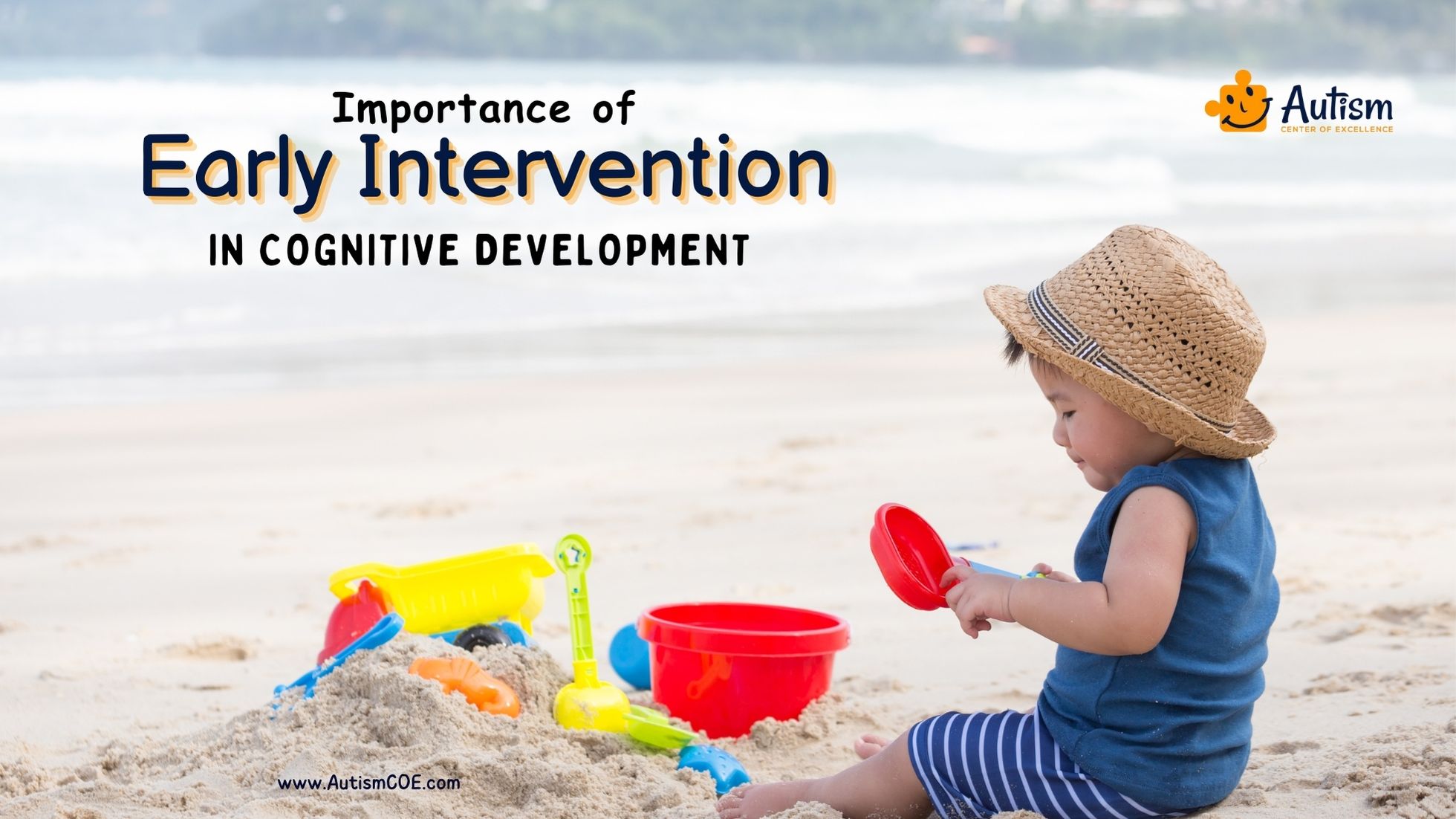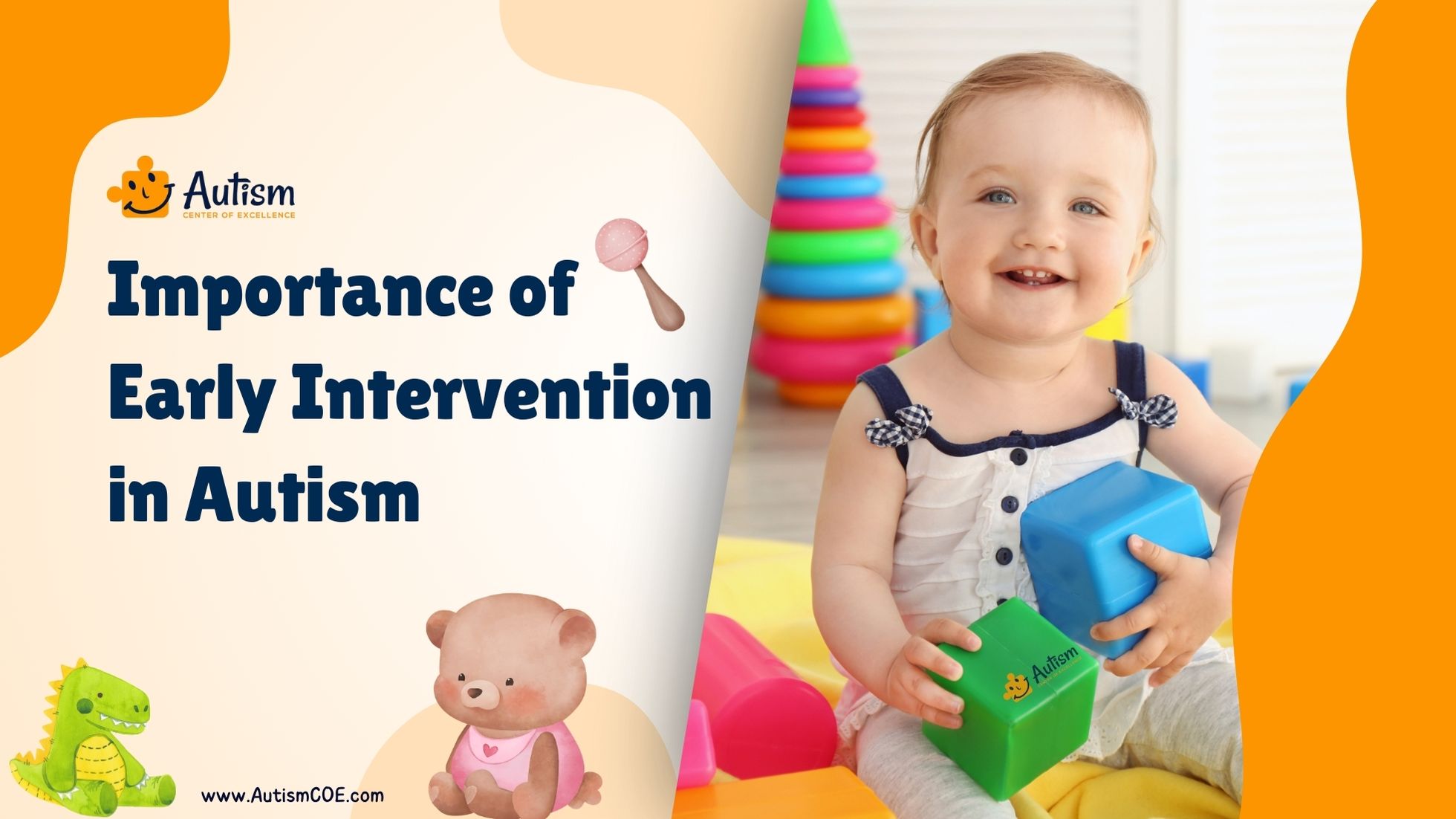The Importance of Early Intervention in Autism cannot be overemphasized as it is a crucial factor. Autism Early Intervention Services refer to the special care and therapy that young children with autism require in order to help them foster their development. These services are most helpful in application when autism is detected at an early age. Early intervention is basically the management of developmental delays as well as enhancing the cognitive, social, and language development of children with autism; this will in the long run have a positive impact on the child’s development. Such programs have positive impacts not only on the child but also on families and communities, which contribute to enhancing positive social relationships.
Why Early Intervention is Important for Autism?
Many research studies have established that children with autism who receive Early Intervention Services show important gains in different aspects of their development including their cognitive, language, and social-emotional development.
The National Institute of Child Health and Human Development (NICHD) has mentioned that children with autism who begin the process of autism-specific interventions before the age of three have much better language development and adaptive behavior than children who start the process at the age of three or later. From these findings, it is clear that the brain is highly receptive to modification in early childhood, and this is why interventions are allowed.
These early intervention programs are evidence-based by their very design, which means they are the cornerstone of any proper therapy. According to the Centers for Disease Control and Prevention (CDC), ABA Intervention in the first years of life can reduce the effects of Autism Symptoms and improve adaptive behaviors.
Other therapies such as early speech and Occupational therapy are also more effective as they assist the child develop on other aspects that are considered milestones in childhood and at the same time equip families with tools that can help them manage their children.
Early Intervention and ABA Therapy for Autism
The Importance of Early Intervention ABA Therapy lies in its ability to significantly improve outcomes for children with autism. Applied Behavior Analysis (ABA) is a research-validated treatment that focuses on increasing the desired behaviors and reducing the undesired ones. Thus, ABA therapy is a rather effective approach in the early stages of a child’s development to develop crucial social, communication, and adaptive skills.
There are various research which have suggested that when ABA Therapy is conducted on children in their toddlerhood then it can lead to the improvement in the language, academic performance, and daily living skills of the child.
Also, it is crucial to note that the applied behavior analysis therapy is well-structured and individualized; thus, the child’s needs can be met. This helps in making the interventions more effective and interesting, hence enhancing learning and recall. It is also important to stress that early ABA therapy also has a positive impact on the child as well as on the parents and other caregivers, as they get tools to help the child.
Therefore, it is clear that including ABA Therapy in Early Intervention Programs for Autism is highly beneficial to children and their families.

The Importance of Early Intervention in Special Education
Early childhood interventions are critical in the growth of children with disabilities including Autism, and Special Education is one of the vital aspects that have been seen to greatly affect the process. Therefore, when specialized educational services are provided to children as early as possible in their age of learning, they stand a better chance of acquiring the right cognitive, social, and emotional skills that are essential for learning. This is because early identification of developmental delays helps the child to get the appropriate support to enhance learning and also to assist in the development of Individualized Education Plans (IEPs) that are best suited for the child.
Also, it is important to note that early intervention in special education enables children with disabilities to have equal chances of learning as other children. By embracing such an approach, every child has a chance to develop and flourish in the same class, and such children learn tolerance and acceptance.
Furthermore, Autism Early Intervention Services may involve a group treatment where the child may be attended to by teachers, therapists or parents. This approach not only improves the child’s learning process but also empowers the families with the information and resources that they need to support their child’s learning.
Impact of Early Intervention on Language and Communication Skills
One of the hallmark characteristics of autism is difficulty with language and communication. These skills can be enhanced through Early Intervention Services that enable children with autism to communicate their needs and wants and form healthy relationships.
The findings on Autism Early Intervention Strategies state that integrating Speech Therapy Results in Better Communication Outcomes. These may include special measures that may be put in place to address the needs of each child with autism depending on his strengths and weaknesses. Some of the strategies include the use of Augmentative and Alternative Communication (AAC), Play Intervention and social stories. These can be included in early childhood treatment programs for children with autism which will help them improve their communication and therefore, their future quality of life and achievements in school.
The Importance of Early Intervention Speech Therapy:
- This is especially helpful for children with autism who usually have difficulties in language and communication.
- This addresses communication problems by concentrating on fundamentals that children must learn in their early years.
- Different studies reveal that children who undergo Speech Therapy before the age of five have much better language development.
- Assists the child to communicate, play, form attachments, and interact with other people.
Addressing Developmental Disabilities at An Early Age
Realizing the Importance of Early Intervention for Children with Disabilities helps us to provide timely support in a critical development period. Prevention and Early Detection coupled with early childhood education and intervention for children with autism enable the provision of appropriate therapy and educational services that address the child’s specific needs. The benefits of early intervention span multiple developmental areas, including:
- Cognitive development
- Social interactions
- Emotional regulation
- Physical skills
Intervening early developmental delays helps children with disabilities to have a good starting point for future learning and development. The benefits of early diagnosis of autism are significant as they allow caregivers and professionals to develop specific strategies and approaches that can help the child reach his or her full potential.
Join Our Weekly Newsletters!
Subscribe now to stay updated with our latest email updates.

Early Intervention is Crucial for Optimal Cognitive Development
As a form of preventative care, early intervention programs are intended to address developmental deficits and foster cognitive abilities during the initial years of life because the brain is most amenable to these types of changes. Understanding the importance of early intervention in Cognitive Development is essential for establishing a solid foundation for a child’s future learning and intellectual growth.
Through the use of therapies and educational strategies, children can enhance their cognitive skills, including problem-solving, memory, attention, and reasoning. These interventions not only assist children in meeting the standard of other children but also improve their learning and problem-solving.
Cognitive development when done in early childhood prepares children to face most challenges that they may face in their daily lives, thus leading to a healthy and successful life.
Integrating Occupational Therapy in Early Intervention
Fine motor skills, sensory integration, and adaptive behavior are some of the areas of development that Occupational Therapy addresses which are essential in the development of a child. Through occupational therapy in early intervention programs, children with autism get individualized care suited to their requirements. Therapists work with families and teachers to develop intervention programs that teach the child self-care, play, and social interaction skills. This approach assists children in attaining developmental milestones in a most efficient and confident manner.
Furthermore, Early Intervention Autism Occupational Therapy assists the children to cope with the environment by enhancing their sensory processing as well as their responses to stimuli. By engaging in activities that mimic real-life situations, children are able to discover their environment and how to effectively interact with it as they grow up in society.
Thus, embedding occupational therapy into early intervention caters to the current developmental requirements and promotes future educational achievements and livelihoods, thus creating a healthier society for young children.
Frequently Asked Questions & Answer
What Types of Therapies are Commonly Included in Early Intervention Programs for Children with Autism?
Common services offered as part of early intervention include speech therapy, occupational therapy, behavioral therapy (like ABA therapy), and sometimes physical therapy. These therapies are provided to each child to ensure that they grow and develop well.
What Role Do Families Play in The Early Intervention Process for Children with Autism?
Parents and families are also involved in the process of early intervention with the child through attending therapy sessions, implementing the strategies at home, and fighting for the child’s rights. This is important for the success of the intervention because they will help to maintain the frequency of the intervention and support the skills which are being taught.
How Can Parents Identify if Their Child Might Benefit from Early Intervention Services?
Some of the symptoms that parents can observe and could be an indication of autism include delayed speech, lack of eye contact, repetitive activities, and problems in social interaction. If they do the following, they should get an evaluation from a health care professional who can refer them to an early intervention program.
What are Some Challenges Associated with Accessing Early Intervention Services for Children with Autism?
Some of the challenges may include shortage of services, delays in accessing services, and costs associated with services. Such challenges can be managed by engaging the relevant organizations, using telehealth services, and campaigning for more funding and expansion of early intervention programs.
Conclusion
The effectiveness of Autism Therapy Services underscores the importance of early intervention for children with autism. It is an intense form of support that has been shown to make a profound difference in the child’s development and it addresses communication, behavior, and social skills. Other supportive services like Speech Therapy, occupational therapy, and behavioral interventions are offered depending on the child’s needs to ensure that the child gets the best at the right developmental stage. This early intervention is very important for the child not only in the growth of the early years but also in the future development of the child.
Autism Center of Excellence plays a pivotal role in advocating for and providing comprehensive early intervention services. By offering specialized programs and resources, AutismCOE helps families navigate the complexities of autism and ensures that children receive the highest quality care and support.
Please Note: The content of this blog is for informational purposes only and should not be considered a substitute for professional medical advice, diagnosis, or treatment. Consult a qualified healthcare professional for personalized guidance tailored to your specific situation.

Bhavika Bhasin
Bhavika Bhasin is the Research and Marketing officer at AutismCOE. She works with children and adults with ASD. Her clinical research includes evaluating various available autism screening and diagnosis methods and their efficacy. She is currently developing a novel screening exam that is indicated to be more accurate than the existing available exams. She is also writes articles papers for various publications.


